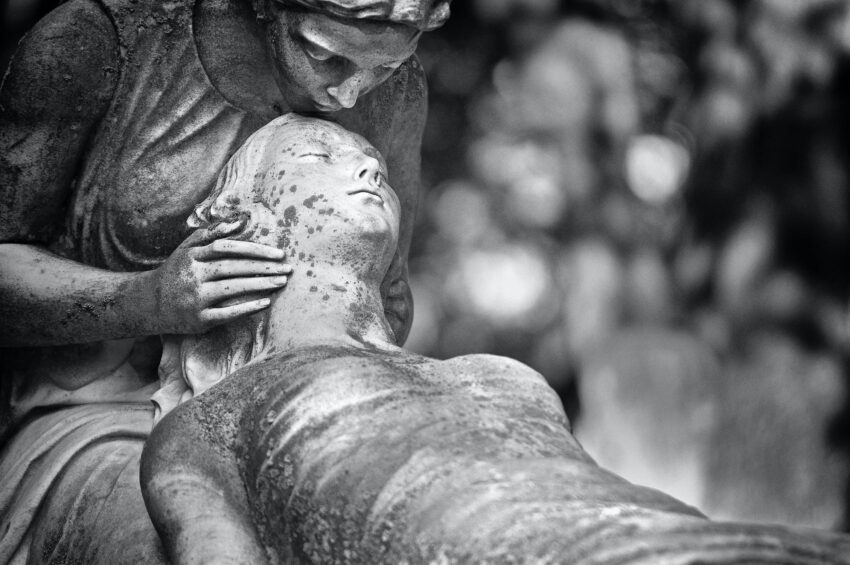Just as a birthing doula helps with the beginning of life, death doulas help a dying person and their family navigate the end-of-life experience.
Many women – especially pregnant women and those who’ve gone through childbirth – would be familiar with doulas, whose main role is to support a woman through pregnancy and childbirth, sometimes providing postnatal support as well.
But now a new kind of doula has emerged: the death, or end-of-life, doula.

The word doula comes from ancient Greek, meaning ‘a woman who serves’. Of course, not all death doulas are women but, in most cases, they are.
Just like birthing doulas, death doulas provide compassionate support, assistance, and companionship. But they do so at the end-of-life, rather than at its beginning.
Death doulas help break down the fear that exists around death.
Death is a personal, complex, and emotional experience that shouldn’t be approached simplistically. Death doulas help break down the fear that exists around death.

Death has also become increasingly medicalised, with many people removed from the community setting to die in hospital. However, current health and social support systems often don’t completely meet the needs of the dying.
There are roles that carers or family members of the dying person do not want health professionals to take on, or they think should not be performed by a health professional.
Death doulas have emerged to fill these gaps, responding to an overwhelming demand placed on families and health professionals caring for individuals at the end-of-life.
They can help make death more personal, something that is spoken about openly, without shame, as they hand control over to the dying person.
A 2019 study by Flinders University found that many death doulas came to the role with their own set of experiences, knowledge and beliefs that had been developed over their professional lifespan working as a nurse or social worker.
Some were drawn to the role because of personal experiences with death. They’d witnessed situations where there was a lack of support or knowledge and they wanted to provide that to others.

The study’s respondents described the death doula role as one that reduced fear and anxiety around death, provided holistic care, and empowered individuals, families, and carers by providing information and choices at end-of-life.
This included providing physical, emotional, and spiritual support and assistance.
Many viewed themselves as an addition to the health profession; an extra layer of support.
Importantly, many viewed themselves as an addition to the health profession; an extra layer of support provided to the dying person. While most death doulas predominantly work with individuals in their homes, many also work within hospitals, hospices, and long-term care facilities.

A 2020 survey of death doulas operating across Australia, Canada, the US, and the UK found that they performed a wide variety of services, including:
- Advance care planning, including organ donation.
- Liaising with health care workers and other community services.
- Facilitating legal paperwork such as power of attorney.
- Keeping family members informed and coordinating family and friend visits.
- Assisting with funeral coordination.
- Providing emotional and spiritual support in the form of visualisation and guided imagery, breathwork and touch, music therapy, and designing and conducting living funerals.
- Explaining diagnoses and treatment.
- Normalising end-of-life by providing practical information about what to expect and common end-of-life signs and symptoms to the individual, their family and friends.
- Providing companionship through listening and unstructured conversation, sitting vigil during the active dying phase.
- Regularly assessing pain and symptoms and providing pain and symptom management through light massage and/or use of essential oils.
- Providing respite for family members.
- Assisting with housework.
- Offering after-death care such as washing the body, assisting with after-death paperwork, and providing bereavement support for the family.
Death doulas not only also assist adults at end-of-life but children as well. This includes miscarriage, abortion, stillbirth and infant loss.
In the paediatric setting, the doula helps the child feel safe and understood.
In the paediatric setting, the doula helps the child feel safe and understood. Gentler therapies like meditation, art therapy, journaling, breathwork and yoga help to create a safe space and are often used with children at end-of-life.
By teaching them emotional intelligence and lateral thinking, children can better process information relating to death.

More people are becoming death doulas as Australia’s ageing population continues to grow. While several Australian organisations offer training and certification, at present there is a lack of regulation and standardised training which has diminished the standing of death doulas in the community.
There are also potential legal implications which may arise. For example, if a death doula is made the beneficiary of a dying patient’s will because of last-minute changes made to the will.
In addition, unregistered health practitioners are subject to state and national codes of conduct. An unregistered health practitioner is someone who provides a health service and doesn’t have to be registered to provide that service.
Death doulas are not for everyone. Each person’s end-of-life experience is as unique as they are. But they can provide the support and advice needed. There are a few things to keep in mind when considering using a death doula:
- Consider their education and training.
- Research what specific services they offer.
- Talk to others about their experience with death doulas to find one that fits.






